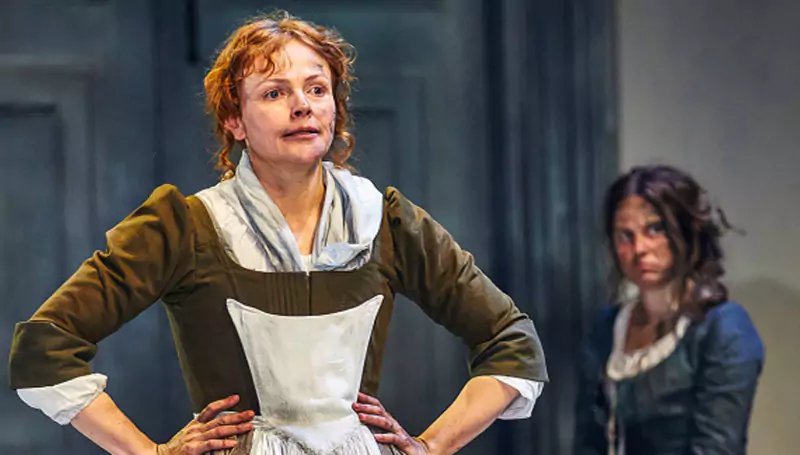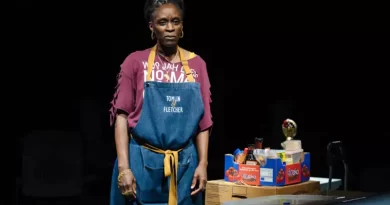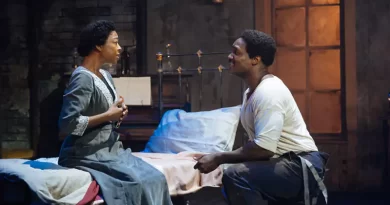“The Welkin” at the Lyttelton, National Theatre
Julie Sorokurs on the South Bank
23 January 2020
If Lucy Kirkwood’s previous projects are anything to go by — as varied in subject matter as Chimerica (about the complex relationship between China and the United States) and Mosquitos (a family drama with a background of particle physics) — then it is hardly surprising that The Welkin proved to be yet another innovative and ambitious curveball when it had its world premiere at the National’s Lyttelton Theatre in January. The Old English word welkin for “clouds” or “heavens” that Kirkwood took as her title, not only hints at the scale of this production but also joins its heroine in reaching for the hitherto unattained heights of both human reasoning and compassion.
The opening scenes, as they follow one another in quick succession, establish and maintain a dizzying soundscape made up of the din of housework, child-rearing, and butter-churning (Carolyn Downing’s work). Here already, the audience is encouraged to follow a narrative that is not singular, but instead relies on the concurrent existence of a multiplicity of extracts, both visual and aural, that make up a woman’s field of reference. This aesthetic is utilized throughout the play, as much for comic effect as it is for moments of gut-wrenching sorrow.
Directed by James Macdonald (a regular collaborator of Caryl Churchill’s), The Welkin takes place in rural Suffolk in 1759, where Sally Poppy (Ria Zmitrowicz is a force to behold) is due to be hanged for the murder of a young child. When Sally pleads her belly, a jury of twelve matrons is assembled to determine whether or not she is indeed in the early stages of pregnancy. Kirkwood’s play is deeply situated in historical fact, as this was indeed the protocol up until the innovations of the twentieth century. The play is also endlessly funny and often centres with affection on some of the more hapless characters.
We learn of the circumstances of each juror as she is invited to step forward and be sworn in by the judge — stories that are as amusing as they are dark and confessional. While one positively dotes on her husband and finds that “thing” he does with his tongue very “amenable” another has been mute since the birth of her child decades ago. Amongst them is midwife Elizabeth Luke (compellingly played by the brilliant Maxine Peake), who has been quietly suffering over the deaths of twelve babies she delivered in as many months. She is the only one who hesitates in kissing the Bible, suspicious as she is of a process that could compel a group of twelve women to turn against one of their own. She is determined not to hand over Sally into the hands of the baying, blood-thirsty mob outside.
Locked into an expansive room in the courthouse (Bunny Christie’s evocative design, conspicuously coloured in several shades of grey) without “meat, drink, fire or candle” the twelve work towards a unanimous verdict. Elizabeth implores everyone to vote fairly, not to quibble over Sally’s guilt or whether she is deserving of exile, but to think of the unborn child. This urgency is all the more breath-taking through a contemporary lens, it being an opportunity for a group of women to operate outside of the laws and concerns of men. Elizabeth’s anger might as well be directed trans-historically, as it is not only towards a male-oriented system of justice, but at the masculinist language of law and order and, indeed, moral reasoning itself. “This court was not built for us” she regularly reminds the others. Crucially, the only man present during their deliberations is Mr Coombes the bailiff, though he is only allowed to speak if it is to ask whether a decision has been reached.
Some of the most vivid language and, even, movement in The Welkin is exclusively female, from graphic discussions of all the different ways a pregnancy might wreak havoc on a woman’s body to the handcuffed Sally spending a protracted amount of time rearranging her dress and underwear in order to relieve herself into a bucket. The women regularly bicker and gossip and split into factions over the verdict, though when a (male) doctor is finally brought in to confirm Sally’s pregnancy, the twelve converge to keep Sally out of view of the bailiff.
Occasional heavy-handed moments threaten to take away from the subtlety and calculated nerve of Kirkwood’s play. The anticipated passage of Halley’s Comet, for example, is noted to have been much more studied than a woman’s body ever has. There are certain plot twists that verge on the melodramatic and are arguably unnecessary in propelling the narrative. l also have to admit that the Suffolk accents stumped me on more than one occasion, to the point where entire exchanges, rife with both revelation and liberation, were more or less lost on me. The gift of Kirkwood’s drama surely deserves precedence over maintaining the “authenticity” of the play taking place in eighteenth-century Suffolk, especially when The Welkin brims with allusions and parallels to the contemporary moment.









